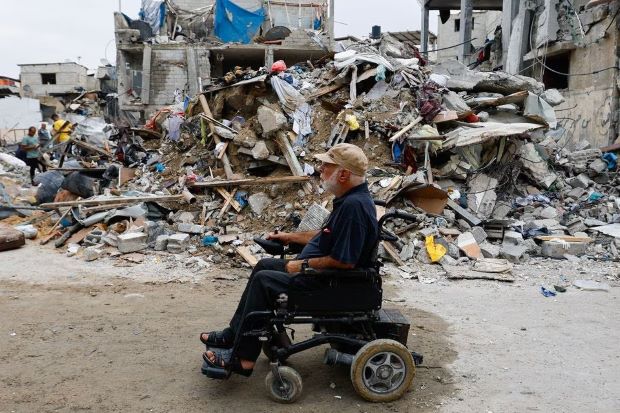Egypt refuses to allow Palestinians to seek refuge in Sinai
By Liam Stack
CAIRO – Egypt’s president said Tuesday (10) that his country would not allow Palestinians to flee the bombardment of Gaza and seek refuge in his country, closing off the only evacuation route for civilians seeking to heed Israel’s warning and leave.
“Egypt hopes for a resolution of the Palestinian cause through negotiations leading to a just peace and the establishment of a Palestinian state,” Egyptian President Abdel-Fattah el-Sissi said in comments reported by the state-backed Middle East News Agency. “However, Egypt will not allow the Palestinian cause to be settled at the expense of other parties.”
Israel has warned that civilians should leave the Gaza Strip, which has been under heavy Israeli bombardment since Hamas gunmen staged a deadly cross-border attack on Saturday (7). But getting out has long been difficult: Israel and Egypt imposed a blockade on Gaza after Hamas took power in 2007, allowing only a trickle of goods and a small number of people to leave the impoverished territory for work and medical care.
All border crossings between Israel and Gaza have been closed since the attack on Saturday, and the only crossing between Gaza and Egypt, at Rafah, was hit by Israeli airstrikes Tuesday night. It was closed Wednesday (11), Reuters reported.
El-Sissi’s comments reflect decades-old Egyptian concerns that Israel may try to resolve the conflict in Gaza by expelling its Arab population into Egypt’s Sinai Peninsula, an arid and sparsely populated region that has long been home to an insurgency against Cairo.
Egyptian state media, quoting an unnamed security source, said Wednesday that “the Israeli occupation has sought throughout the conflict to try to resettle the people of Gaza in Sinai,” adding that it was “forcing Palestinians to choose between death under bombing or displacement outside their lands.”
In the comments reported by Egyptian state media, el-Sissi called the war in Gaza “highly dangerous” and warned it “could affect the security and the stability of the region”.
Egypt has fought several wars with Israel, which occupied Egypt’s Sinai Peninsula and established 18 Israeli settlements there between 1967 and 1982. But in 1979 Egypt became the first Arab country to make peace with Israel, ending decades of conflict.
Since then, the two have had a sometimes frosty but often productive relationship that includes cooperation in security and intelligence matters, especially when it comes to the Gaza Strip, which Egypt ruled from 1948 until 1967 but has long viewed as a security risk.
For many years during the Israeli and Egyptian blockade of Gaza, the border between Egypt and the Gaza Strip was crisscrossed by a complex network of smuggling tunnels. They provided Gazans with a lifeline for goods — everything from packaged foods and medicine to cement — that its 2 million people needed to survive. But they also provided an avenue for weapons to enter Gaza.
Egypt has gone to great lengths to dismantle those smuggling networks, which it also feared would allow militants and weapons into the Sinai Peninsula. In 2014, Egypt even leveled parts of Rafah on its side of the border to destroy tunnels.
Egypt has also spent a decade violently suppressing the Muslim Brotherhood, an ideological cousin of Hamas. The brotherhood won Egypt’s first and only democratic presidential election in 2012, but that government was overthrown in a military coup orchestrated by el-Sissi the following year.
Many of the brotherhood’s elected officials were jailed or killed, including the deposed president, Mohammed Morsi, who died in a Cairo courtroom in 2019.
-New York Times



Comments are closed, but trackbacks and pingbacks are open.